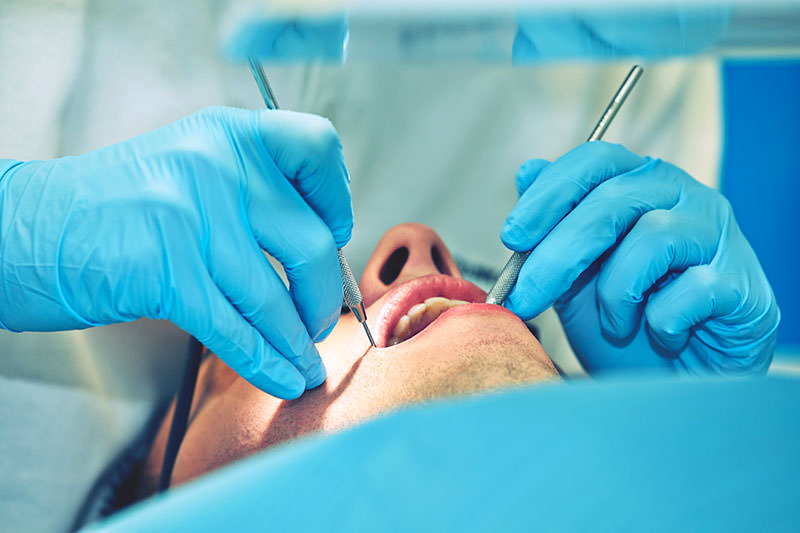
What to Expect after Wisdom Teeth Removal
Nearly everyone has their wisdom teeth removed at some point in their lives.
While the wisdom teeth procedure is routine, its post-operative nature makes proper aftercare vital to your recovery. Here’s what you can expect following wisdom teeth surgery.
How Long is the Healing Process?
One of the top internet searches surrounding wisdom teeth removal is, “how long does it take for the hole close?” Recovery time for this operation can take anywhere from one to two weeks when you care for the wound properly.
Luckily, patients can see and feel daily improvement. Wisdom tooth removal swelling is improved within three days, soreness and stiffness dissipate after ten days, and bruising is no longer present two-weeks after wisdom teeth removal.
Keep in mind that recovery time does vary on a patient by patient basis.
With the two-week timeframe different for each patient, it helps to schedule an appointment with your dentist during that time. Every wisdom teeth removal is unique to that patient and your dentist can tell you if the hole is closed completely closed.
How Painful Will It Be?
Patients are always worried about how painful the wisdom teeth operation is, but it’s more manageable than you might think.
So, how long should it hurt after having a wisdom tooth procedure? How long does the wisdom tooth surgery pain last?
Wisdom tooth pain is subjective, meaning each patient has a different experience. Some might say it was the worst experience of their life while most simply say they felt sore for a few days. Bruising, swelling, and pain are common after a wisdom teeth procedure.
Swelling after wisdom tooth extraction tends to be the most noticeable symptom. Having any tooth removed is an operation that causes swelling, but wisdom teeth can increase this effect due to their location.
Experiencing a sore throat after a wisdom tooth extraction is also common. This happens when the throat muscles swell as well, making it difficult or painful to swallow. Jaw stiffness is another regularly experienced side effect, which can make talking or eating a little painful.
Generally speaking, patients experience a moderate amount of pain and discomfort. This is why most wisdom tooth removals require sedation. Patients are also given prescriptions afterward to help alleviate the pain associated with the procedure.
Prescriptions for pain management are common following wisdom tooth removal. If a pain prescription is given, be sure to follow the instructions on the bottle and take your medication with food, your pain should be more than manageable. Tylenol and Ibuprofen can help with any additional pain as well.
As for the length of your pain, most patients find that their symptoms subside around three or four days after the wisdom tooth operation. From there to the two-week mark, the level of pain you experience will continue to decline.
Proper Care and Cleaning
You can speed up your recovery time and lessen your pain just by adequately caring for the hole left after the extraction.
Cleaning is also vital to fending off an infection after wisdom teeth removal. Here’s what to do to make the healing process as simple as possible.
Immediately After the Surgery
The dentist places gauze over the surgical area where the wisdom tooth was extracted, which you’ll want to keep in place. Avoid touching or rinsing out the area and place an ice pack on your face to help reduce the swelling. On day one, the main thing to care for is bleeding.
Make sure to change your gauze pads every hour by discarding the old one and folding two to three new pads and placing them over the hole. Bite down firmly, applying light pressure to the wound. This will cause the pads to stick.
Bleeding typically stops around two or three hours after wisdom teeth surgery. However, irregular bleeding over the next 48 hours is common. Avoid smoking, drinking through a straw, and spitting during this time to allow a clot to form.
Cleaning
While your first urge after getting home might be rinsing your mouth out, don’t. You can begin cleaning your teeth again after the first night. After the clot forms, you can rinse your mouth out with mouthwash to help keep the wound clean.
Don’t neglect brushing your teeth during this time, either. Just make sure to be as gentle as possible around any wisdom tooth surgical sites. Too much pressure or an action like smoking can cause the blood clot to dislodge, creating a painful dry socket. Avoid flossing near the wound for now as well.
After 24 hours, dentists recommend rinsing with warm water and salt to help reduce swelling. Antiseptic mouthwash should be used two to three times a day to help prevent infections.
Diet
Your diet following the wisdom tooth removal is strict for a few days. Soups, smoothies, and apple sauce are the safest choices. Items like Jell-O and yogurt are also easy to eat afterward. Try to stick with a liquid diet as much as possible for two weeks.
Stay away from any foods that could become stuck in the surgical site, spicy dishes, and chewy foods like gum or meats. Acidic foods can irritate the tissue as well. Most importantly, avoid using a straw to help prevent a dry socket.
By day 3 after wisdom tooth removal, you can begin eating normally again. Start with easy-to-chew foods like eggs and mashed potatoes. Then, gradually transition back to your normal diet.
Caring for Yourself
Fatigue is a common symptom most patients experience after having their wisdom teeth removed. It’s highly recommended that you get as much sleep as possible on the first few nights following the wisdom teeth operation.
If you normally exercise daily, take into account that a lack of nourishment from your diet could weaken your body. Carefully gauge how you feel, stopping if you begin to feel light-headed.
Preventing Infection
While proper care and cleaning help to prevent complications, it helps to know the signs of infection after wisdom tooth extraction. Infections happen when bacteria or food particles find their way into the hole your wisdom teeth left behind. Call your dentist immediately if you experience:
- Excessive bleeding
- Fever
- Difficulty swallowing or breathing
- Pus or oozing
- Persistent numbness
- Blood or discharge from your nose
- Your pain medication isn’t working
- Your swelling becomes worse after three days
Are There Any Complications?
While this surgery is routine, there can be several wisdom teeth removal complications to consider.
The first is a dry socket. This common complication happens when a blood clot either does not form or becomes dislodged. Proper cleaning and dieting almost always prevents this.
The second complication is known as paresthesia, which is a numbness of the mouth and jaw. Paresthesia happens when the nerves around the jawbone are bruised during wisdom tooth surgery. In most cases, this numbness lasts a few days to a week.
Another less-serious complication is nightly pain, which you’re already experiencing with your wisdom teeth.
Why do wisdom teeth hurt at night, and why is the pain worse at night after the surgery? Right now, your teeth could hurt more during the night from unconscious grinding, added pressure from stress or your sleeping position, and the types of food you eat before bed. For people with wisdom teeth and those recovering from surgery, pain is often worse at night simply because that’s when you notice it.
Contact NextGen OMS
Do you need an experienced oral surgeon to look at your wisdom teeth? Or maybe you have more questions about your wisdom teeth?
Contact Dr. Eftekhari today with any questions you have about your widsom teeth.


